What If? (40 page)
Authors: Randall Munroe

Facebook of the Dead
Q.
When, if ever, will Facebook contain more profiles of dead people than of living ones?
—Emily Dunham

“Put on your headphones!” “Can’t. Ears fell off.”
A.
Either the 2060
s
or
the 2130s.
Th
ere are not a lot of dead people on Facebook.
1
Th
e main reasons for this is that Facebook
—
and its users
—
are young.
Th
e average Facebook user has gotten older over the last few years, but the site is still used at a much higher rate by the young than by the old.
The past
Based on
the site’s growth rate, and the age breakdown of its users over time,
2
there are probably 10 to 20 million people who created Facebook profiles who have since died.
Th
ese people are, at the moment, spread out pretty evenly across the age spectrum. Young people have a much lower death rate than people in their 60s or 70s, but they make up a substantial share of the dead on Facebook simply because
there have been so many of them using it.
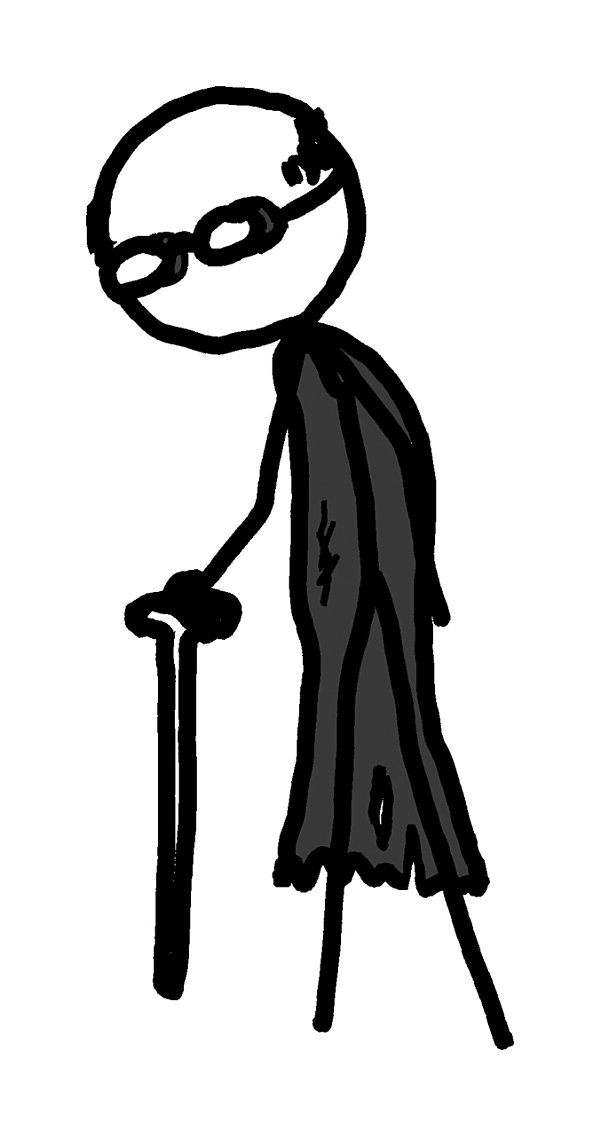
An elderly Cory Doctorow cosplaying by wearing what the future thinks he wore in the past.
The future
About 290,000 US Facebook users probably died in 2013.
Th
e worldwide total for 2013 is likely several million.
3
In just seven years, this death rate will double, and in seven more years it will double again.
Even if Facebook closes registration tomorrow, the
number of deaths per year will continue to grow for many decades, as the generation who was in college between 2000 and 2020 grows old.
Th
e deciding factor in when the dead will outnumber the living is whether Facebook adds new living users
—
ideally, young ones
—
fast enough to outrun this tide of death for a while.
Facebook 2100
Th
is brings us to the question of Facebook’s future.
We don’t have enough experience with social networks to say with any kind of certainty how long Facebook will last. Most websites have flared up and then gradually declined in popularity, so it’s reasonable to assume Facebook will follow that pattern.
4
In that scenario, where Facebook starts losing market share later this decade and never recovers, Facebook’s crossover date
—
the date when the
dead outnumber the living
—
will come sometime around 2065.
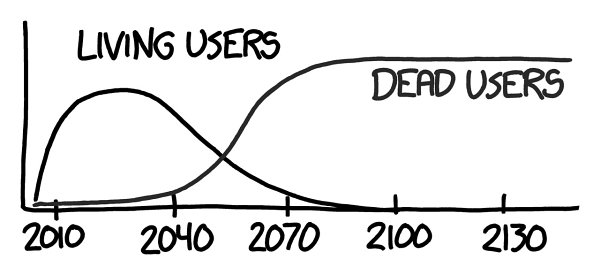
But maybe it won’t. Maybe it will take on a role like the TCP protocol, where it becomes a piece of infrastructure on which other things are built, and has the inertia of consensus.
If Facebook is with us for generations, then the crossover date could be as late as the mid-2100s.
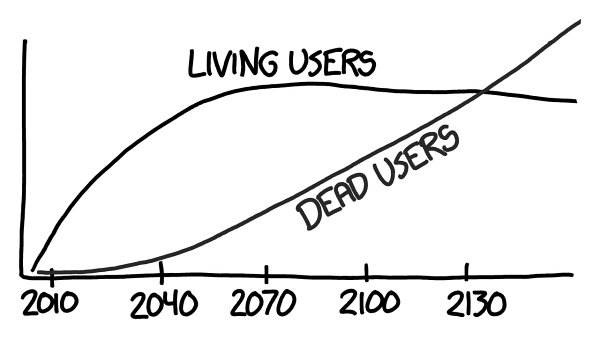
Th
at seems unlikely. Nothing lasts forever, and rapid change has been the norm for anything built on computer technology.
Th
e ground is littered with the bones of websites and technologies that seemed like permanent institutions ten years ago.
It’s possible the reality could be somewhere in between.
5
We’ll just have to wait and find out.
The fate of our accounts
Facebook
can afford to keep all our pages and data indefinitely. Living users will always generate more data than dead ones,
6
and the accounts for active users are the ones that will need to be easily accessible. Even if accounts for dead (or inactive) people make up a majority of their users, it will probably never add up to a large part of its overall infrastructure budget.
More important will be
our decisions. What do we
want
for those pages? Unless we demand that Facebook deletes them, they will presumably, by default, keep copies of everything forever. Even if they don’t, other data-vacuuming organizations will.
Right now, next of kin can convert a dead person’s Facebook profile into a memorial page. But there are a lot of questions surrounding passwords and access to private data
that we haven’t yet developed social norms for. Should accounts remain accessible? What should be made private? Should next of kin have the right to access email? Should memorial pages have comments? How do we handle trolling and vandalism? Should people be allowed to interact with dead user accounts? What lists of friends should they show up on?
Th
ese are issues that we’re currently in the
process of sorting out by trial and error. Death has always been a big, difficult, and emotionally charged subject, and every society finds different ways to handle it.
Th
e basic pieces that make up a human life don’t change. We’ve always eaten, learned, grown, fallen in love, fought, and died. In every place, culture, and technological landscape, we develop a different set of behaviors around
these same activites.
Like every group that came before us, we’re learning how to play those same games on our particular playing field. We’re developing, through sometimes messy trial and error, a new set of social norms for dating, arguing, learning, and growing on the Internet. Sooner or later, we’ll figure out how to mourn.
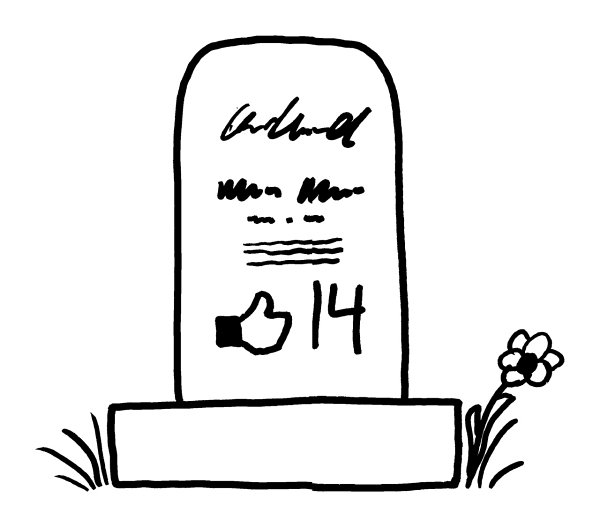
- 1
At the time I wrote this, anyway, which was before the bloody robot revolution.
- 2
You can get user counts for each age group from Facebook’s create-an-ad tool, although you may want to try to account for the fact that Facebook’s age limits cause some people to lie about their ages.
- 3
Note: In some of
these projections, I used US age/usage data extrapolated to the Facebook userbase as a whole, because it’s easier to find US census and actuarial numbers than to assemble the country-by-country for the whole Facebook-using world.
Th
e US isn’t a perfect model of the world, but the basic dynamics
—
young people’s Facebook adoption determines the site’s success or failure while population growth
continues for a while and then levels off
—
will probably hold approximately true. If we assume a rapid Facebook saturation in the developing world, which currently has a faster-growing and younger population, it shifts many of the landmarks by a handful of years, but doesn’t change the overall picture as much as you might expect.
- 4
I’m assuming, in these cases, that
no data is ever deleted. So far, that’s been a reasonable assumption; if you’ve made a Facebook profile, that data probably still exists, and most people who stop using a service don’t bother to delete their profiles. If that behavior changes, or if Facebook performs a mass purging of its archives, the balance could change rapidly and unpredictably.
- 5
Of course, if
there’s a sudden rapid increase in the death rate of Facebook users
—
possibly one that includes humans in general
—
the crossover could happen tomorrow.
- 6
I hope.
Sunset on the British Empire
Q.
When (if ever) did the Sun finally set on the British Empire?
—Kurt Amundson
A.
It hasn’t. Yet. But
only because of a few dozen people living in an area smaller than Disney World.
The world’s largest empire
Th
e British Empire spanned the globe.
Th
is led to the saying that the Sun never set on it, since it was always daytime somewhere in the
Empire.
It’s hard to figure out exactly when this long daylight began.
Th
e whole process of claiming a colony (on land already occupied by other people) is awfully arbitrary in the first place. Essentially, the British built their empire by sailing around and sticking flags on random beaches.
Th
is makes it hard to decide when a particular spot in a country was “officially” added to the Empire.
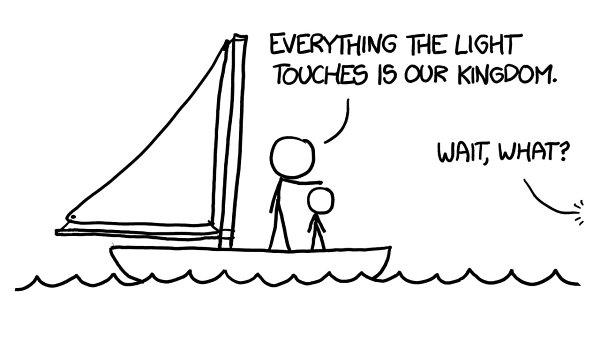
“What about that shadowy place over there?” “
Th
at’s France. We’ll get it one of these days.”
Th
e exact day when the Sun stopped setting on the Empire was probably sometime in the late 1700s or early 1800s, when the first Australian territories were added.
Th
e Empire largely disintegrated in the early 20th century, but
—
surprisingly
—
the Sun hasn’t technically started setting
on it again.
Fourteen territories
Britain has 14 overseas territories, the direct remnants of the British Empire.
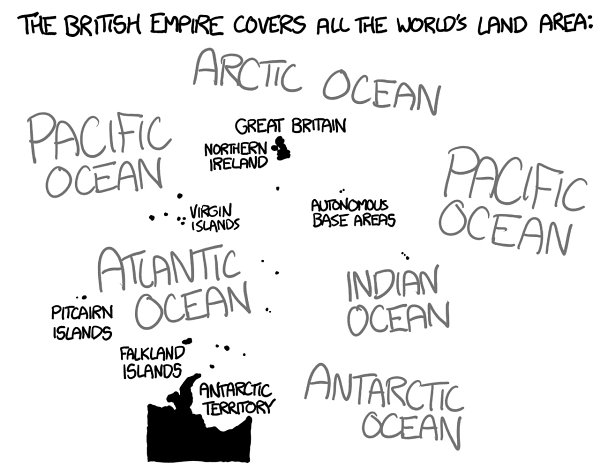
Many newly independent British colonies joined the Commonwealth of Nations. Some of them, like Canada and Australia, have Queen Elizabeth as their official monarch. However, they are independent states that happen to have the same queen; they are not part of any empire.
1
Th
e Sun never sets on all 14 British territories at once (or even 13, if you don’t count the British Antarctic
Territory). However, if the UK loses one tiny territory, it will experience its first Empire-wide sunset in over two centuries.
Every night, around midnight GMT, the Sun sets on the Cayman Islands, and doesn’t rise over the British Indian Ocean Territory until after 1:00
a.m
. For that hour, the little Pitcairn Islands in the South Pacific are the only British territory in the Sun.
Th
e
Pitcairn Islands have a population of a few dozen people, the descendants of the mutineers from the HMS
Bounty
.
Th
e islands became notorious in 2004 when a third of the adult male population, including the mayor, were convicted of child sexual abuse.
As awful as the islands may be, they remain part of the British Empire, and unless they’re kicked out, the two-century-long British daylight
will continue.
Will it last
forever
?
Well, maybe.
In April of 2432, the island will experience its first total solar eclipse since the mutineers arrived.
Luckily for the Empire, the eclipse happens at a time when the Sun is over the Cayman Islands in the Caribbean.
Th
ose areas won’t see a total eclipse; the Sun will even still be shining in London.
In fact, no total eclipse
for the next thousand years will pass over the Pitcairn Islands at the right time of day to end the streak. If the UK keeps its current territories and borders, it can stretch out the daylight for a long, long time.
But not forever. Eventually
—
many millennia in the future
—
an eclipse will come for the island, and the Sun will finally set on the British Empire.
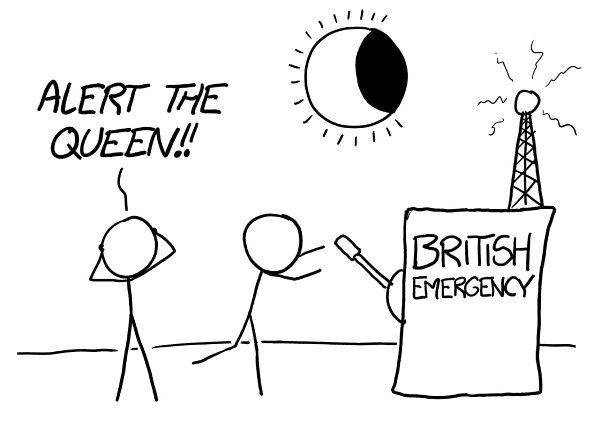
- 1
Th
at they know of.
